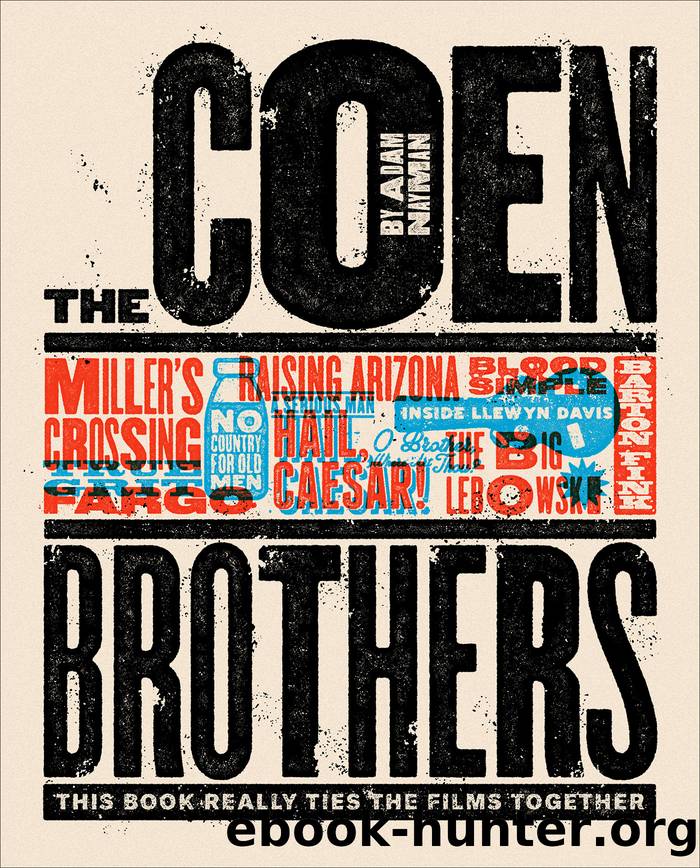The Coen Brothers by Adam Nayman

Author:Adam Nayman
Language: eng
Format: epub
Publisher: Abrams
Published: 2018-01-14T16:00:00+00:00
Intolerable Cruelty
Release Date: October 10, 2003
Budget: $60M
Distributor: Universal Pictures
Cast: George Clooney, Catherine Zeta-Jones, Geoffrey Rush, Cedric the Entertainer, Edward Herrmann, Paul Adelstein, Richard Jenkins, Billy Bob Thornton
Warning! This Film Contains: "Suspicious Minds" 19%, Ass jokes 18%, Alliteration 15%, Trophy husbands 12%, Very silly men 10%, Designer clothes 9%, Nasty lapdogs 7%, Flossing 6%, Self-inflicted gunshot wounds 4%
At the end of The Hudsucker Proxy, the Hula-Hoopâthat polyvalent symbol of both postwar American ingenuity and assembly-line consensusâkeeps spinning on into infinity, as steady and unchanging as the spheres themselves. The Coensâ screwball side came full circle a decade later in Intolerable Cruelty, where Norville Barnes's orb makes a subtle cameo in the final scene in the set design for the studio set for the popular new reality series âAmericaâs Favorite Divorce Videos.â The show is an intolerably cruel confection created by a calculating private detective, bankrolled by unscrupulous litigators, and produced by a philandering Hollywood ex-hotshot trying to make it back to the top by appealing to the lowest common denominator. The message in both movies would seem to be that the circle of mindless popular entertainment remains unbrokenâfor better or for worse.
For better or for worse: The language of matrimony is indeed applicable to a film whose characters spend more time finagling over prenuptial agreements than honeymooning with their spouses. Intolerable Crueltyâs opening credits unfold over hyperbolically parodic animated figures of Cupid firing arrows in every direction and underneath Elvis Presleyâs âSuspicious Minds,â a song that acknowledges the essential paranoia underpinning relationships. The Coensâ ninth feature is a kind of anti-romantic comedy in which impure motivations pile up with increasingly less pretense down the stretch. In his book Pursuits of Happiness, the philosopher and critic Stanley Cavell came up with the term âcomedy of remarriageâ as a way of grouping the great Hollywood screwball comedies of the 1930s and â40s, from It Happened One Night (1934) and Bringing Up Baby (1938) to His Girl Friday (1940) and The Lady Eve (1941).
Cavellâs theory was that because the Hollywood Production Code frowned upon depictions of adultery or sex out of wedlock, the makers of these films contrived scenarios where characters got divorced and flirted with strangers only as a way of reaffirming their attraction for each other. The result was that the movies could be chockablock with innuendo without breaking any rules, on top of which the collective impropriety of the characters and their actions served to level the playing field down from both high-class condescension and pious idealism. For all their scandalous, non-monogamous jokes and incidents, the films Cavell filed under âcomedies of remarriageâ all ended with their central couples together and very much in loveâa mutual affection earned through struggle and self-examination rather than speedily ratified by a priest or justice of the peace.
Ever the clever students of American film history, the Coens take this concept and run with it. Intolerable Cruelty is a comedy of remarriage whose hero is a divorce attorney. Like The Hudsucker Proxy, itâs steeped in screwball
Download
This site does not store any files on its server. We only index and link to content provided by other sites. Please contact the content providers to delete copyright contents if any and email us, we'll remove relevant links or contents immediately.
Machine Learning at Scale with H2O by Gregory Keys | David Whiting(4313)
Never by Ken Follett(3956)
Harry Potter and the Goblet Of Fire by J.K. Rowling(3857)
Fairy Tale by Stephen King(3396)
Unfinished: A Memoir by Priyanka Chopra Jonas(3389)
The Man Who Died Twice by Richard Osman(3078)
Will by Will Smith(2919)
It Starts With Us (It Ends with Us #2) by Colleen Hoover(2367)
Rationality by Steven Pinker(2363)
Can't Hurt Me: Master Your Mind and Defy the Odds - Clean Edition by David Goggins(2341)
The Dark Hours by Michael Connelly(2308)
The Storyteller by Dave Grohl(2236)
Friends, Lovers, and the Big Terrible Thing by Matthew Perry(2230)
The Dawn of Everything: A New History of Humanity by David Graeber & David Wengrow(2208)
The Becoming by Nora Roberts(2202)
The Stranger in the Lifeboat by Mitch Albom(2121)
Cloud Cuckoo Land by Anthony Doerr(2112)
Love on the Brain by Ali Hazelwood(2078)
Einstein: His Life and Universe by Walter Isaacson(2022)
